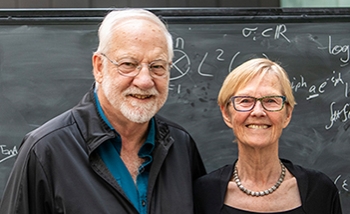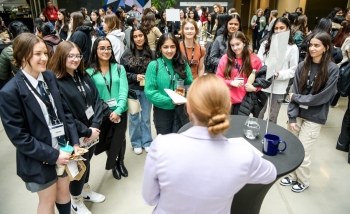It started with an unzipped schoolbag and a spark of imagination.
When Joscelyn van der Veen was in fifth grade, her schoolbag came unzipped. Yet she was certain – positive, really – that she had zipped it up. Her father made an offhand comment: maybe the atoms in the zipper had spontaneously rearranged themselves, rendering it unzipped.
Was such a thing possible, she wondered? Her father’s remark seemed the stuff of science fiction novels. Her interest piqued, she picked up a book on quantum mechanics and awakened a passion.
Joscelyn knew right then that she wanted to study physics. It was a natural choice, combining her interests in both mathematics and storytelling.
“Most of modern physics could be a sci-fi novel,” said Joscelyn. “Physicists seem like science fiction writers who can use math.” The backpack anecdote, she added, inspired her to write a science fiction story of her own – which, she laughed, “I’m realizing now is fairly scientifically inaccurate.”
This love of physics and discovery, along with high academic achievements and a remarkable roster of extracurricular activities and volunteering, won Joscelyn this year’s Luke Santi Award for Student Achievement. The award is presented in memory of Luke Santi, a high school student and friend of Perimeter who had a passion for research and discovery, earning top marks while volunteering his time in service of others.
Like Luke Santi, Joscelyn attended Perimeter’s International Summer School for Young Physicists (ISSYP). She credits her 2015 ISSYP experience as the defining moment when she knew she wanted to turn her interest in physics into a career. “If I enjoy this,” she said of ISSYP, “then I’m pretty sure this is what I can do with my life. It was the most incredible experience I’ve ever had.”
Now 18, Joscelyn is studying mathematical physics at the University of Waterloo.
Last summer, just before starting university, she attended the Quantum Cryptography School for Young Students run by the Institute for Quantum Computing at the University of Waterloo. Learning about concepts such as quantum teleportation further solidified her zeal for unlocking the mysteries of physics.
“Deriving equations is one of the things I find the most fun,” Joscelyn said. “It’s a puzzle. You have all these pieces, and you just have to work with all the pieces until you get this answer that’s so beautiful, and interesting, and different. The cool thing about quantum physics is that it’s not what you’d expect.”
As she was earning top grades in class, Joscelyn was also pursuing a wide array of extracurricular activities, including concert band, cross-country running, and math camp counselling. She also practices and teaches taekwondo, which she values for instilling perseverance and courtesy, and providing a mental break from everything else. “You really have to focus to do it,” Joscelyn explains. “You can’t do a taekwondo pattern properly if you’re thinking about other stuff.”
At university, she’s added a new sport: parkour. With roots in military obstacle course training, parkour involves getting from one point to another in a complex environment (often in an urban setting) as efficiently as possible. Physics comes in handy for some of its seemingly gravity-defying moves, like wall-running.
“The best way to get up a wall is to have your foot perpendicular to it. You want the most normal force from the wall. That gives you the most friction – and then you can go higher,” she explained.
As a volunteer with the University of Waterloo’s physics outreach team, she intends to go on explaining physics concepts, from wall-running to general relativity.
When asked what physics problem she would be most interested in solving, she unhesitatingly names the holy grail of physics: “Quantum gravity. I really think that’s so cool.”
Further exploration
About PI
Perimeter Institute is the world’s largest research hub devoted to theoretical physics. The independent Institute was founded in 1999 to foster breakthroughs in the fundamental understanding of our universe, from the smallest particles to the entire cosmos. Research at Perimeter is motivated by the understanding that fundamental science advances human knowledge and catalyzes innovation, and that today’s theoretical physics is tomorrow’s technology. Located in the Region of Waterloo, the not-for-profit Institute is a unique public-private endeavour, including the Governments of Ontario and Canada, that enables cutting-edge research, trains the next generation of scientific pioneers, and shares the power of physics through award-winning educational outreach and public engagement.
You might be interested in



